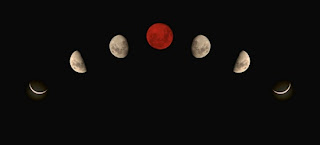
|
| Go with the Flow (Kat Grandy) |
This wasn't always the case, however. When I first got my period, I felt ashamed. -- Much like Lorraine, a mother who reports the following to Karen Gravelle in The Period Book: Everything You Don't Want to Ask (But Need to Know):
My feeling about having a period was one of shame. This feeling was transmitted to me by my mother, who made me feel unhappy about this sensitive moment. Everything she said about the experience was negative. (98-99)
Artist Kat Grandy of the above painting similarly recounts how "having a period was a very secret thing." Today, Grandy is one among several women featured at the Museum of Menstruation and Women's Health who are reclaiming the power of a woman's periodic bleeding through art. Some even through the use of menstrual blood. -- Menstrala is an open site inviting women to submit their own personal art work featuring their menstrual blood as a way to empower women against cultural taboos and positively change the way we feel about menstruation.
Comments Grandy on her above painting (in watercolor):
I was painting this woman wild and free and since I love the color red these days I thought that maybe it would be good to show that red is a good thing - it pumps throughout our body and makes us a warm-blooded animal and so the blood that leaves our body does not have to be considered a bad thing either. It is real, bright, rich and a necessary part of our womaness. Hence - Go With the Flow.I find Grandy's words inspiring. As the Museum of Menstruation and Women's Health documents, women have been shamed to cover up their menstrual blood and odor for years, and in the US especially over the last century.
Now sex educators focused on youth are standing up against this shaming too. In Ready, Set, Grow! A "What's Happening to My Body?" Book for Younger Girls aimed at girls ages eight to eleven, Lynda Madaras, author of numerous puberty books, asserts the celebratory significance of the period:
Having your first period is special. It's an important step in growing up. It shows that you're becoming a woman.
When you tell your parents, they may want to do something special. It could be anything. Your dad might cook your favorite meal. Your mom might take you out to dinner. She might give you a present. It might be something you could pass on to your daughter someday. You might go on a trip or take a walk in the moonlight. It doesn't matter so much what you do. It matters that you celebrate your first period. (101-02)I find Madaras' words as heartening as Grandy's. As the mother of a toddler daughter, I, as Lorraine concludes by stating, want my daughter to feel proud and good about becoming a woman when she eventually gets her period, not ashamed, or frightened and confused, but to see it as a "celebration of life" (Gravelle 99).

|
| Once a Month (Margaret Kalms) |
- how she revealed the wonders of our bodies by biting into a fig to illustrate the ovary with the hundreds of seeds/eggs within;
- how she helped each girl see how they can take charge of their cycle by filling out an imaginary menstrual cycle on a chart copied from Toni Weschler's book Taking Charge of Your Fertility, noting changes in fluids and temperature to calculate the time of ovulation;
- and how she explained to them how well women's bodies know how to give birth--we don't need the sky-high rate of medical interventions and cesarean section in the US--by showing Abby Epstein's documentary The Business of Being Born.
Davis stresses that "it is crucial that young women themselves participate in the design and content of their celebrations, choosing what is comfortable for them" (35). - When the time is ripe for my daughter, I want to help her celebrate in a way that is meaningful to her so she may honor her developing body and womanhood. And as Davis also writes:
I strongly believe that a young woman's experience of menarche affects the quality of her first sexual encounter. If her menarche is honored, especially by the elders of her community in a way that also has meaning to her, she is apt to respect her body and herself too much to casually surrender her virginity. (24)Sources and Resources:
Online:
- Museum of Menstruation and Women's Health
- History of the Menstrual Pad
- Sanitary napkin (Wikipedia)
- Menstrual Art
- Menstrala
- Red Moon - Coming of Age Made Easy; Womanhood Made Richer
- First Moon Rising - The Making of a Menarche Ritual. Mothering Magazine (November-December 2001). By Ksenija Soster-Olmer. (The article describes another Red Party.)
- The Period Book: Everything You Don't Want to Ask (But Need to Know) by Karen Gravelle
- Women's Sexual Passages: Finding Pleasure and Intiamcy at Every Stage of Life by Elizabeth Davis
- The Garden of Fertility: A Guide to Charting Your Fertility Signals to Prevent or Achieve Pregnancy by Katie Singer
-
Taking Charge of Your Fertility: The Definitive Guide to Natural Birth Control, Pregnancy Achievement, and Rproductive Health by Toni Weschler


0 comments:
Post a Comment